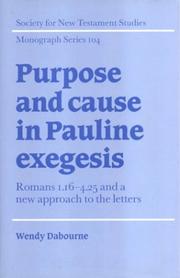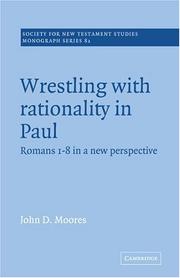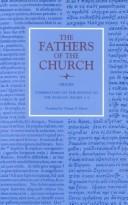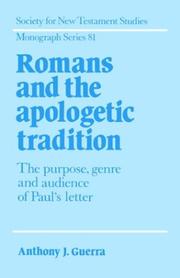| Listing 1 - 10 of 17 | << page >> |
Sort by
|
Book
ISBN: 9780567663887 0567663884 9780567663894 9780567663900 0567663892 0567663906 Year: 2016 Volume: 545 Publisher: New York Bloomsbury T&T Clark US
Abstract | Keywords | Export | Availability | Bookmark
 Loading...
Loading...Choose an application
- Reference Manager
- EndNote
- RefWorks (Direct export to RefWorks)
Robert Lewis examines Paul's use of the phrase "Spirit of Adoption" in Romans 8:12-17 against the background of its Roman Imperial context in order to shed light on interpretation of Paul's Letter to the Romans. Whereas other scholars have explored what Paul may have meant when he uses the term "adoption" Lewis instead explores the reasons behind Paul's coupling of it with the term "spirit". Having examined theories for a possible Jewish antecedent for Paul's use of this phrase, and found them less than persuasive, Lewis unlocks the data within the term's Roman Imperial context that significantly clarifies what Paul means when he uses the phrase "Spirit of adoption". Lewis shows that when Paul wrote his letter to the Romans, adoption had become a feature of Imperial succession. Roman religion gave a great deal of prominence to the Roman family spirit - the genius. The Emperor's genius became identified as a deity in Roman religion and its veneration was widespread in Rome as well as the provinces. When Romans 8.12-17 is read against this background, a very different kind of exegetical picture emerges
Adoption (Theology) --- Biblical teaching. --- History of doctrines. --- Bible. --- 227.1*1 --- Brief van Paulus aan de Romeinen --- 227.1*1 Brief van Paulus aan de Romeinen --- Mystical union --- God (Christianity) --- Fatherhood --- Adoption (Theology) - Biblical teaching. --- Adoption (Theology) - History of doctrines.

ISBN: 0521640032 0521018935 1107115973 0511171870 0511004974 0511149379 0511309627 0511487940 1280432330 051105131X 9780521640039 9780511004971 0511036086 9780511036088 9780511149375 9780511487941 Year: 1999 Volume: 104 Publisher: Cambridge Cambridge University press
Abstract | Keywords | Export | Availability | Bookmark
 Loading...
Loading...Choose an application
- Reference Manager
- EndNote
- RefWorks (Direct export to RefWorks)
Three factors prompt this re-examination of the underlying questions that shape mainstream exegesis of Paul's letters. Hermeneutical studies have destabilized assumptions about the nature of meaning in texts; the letters are usually characterized as pastoral but explicated as expressions of Paul's thought; and the impact of E. P. Sanders' work on Paul has sharpened exegetical problems in Romans 1.16-4.25. The outcome is a two-step method of exegesis that considers a letter first in the light of the author's purpose in creating it and second as evidence for the patterns of thought from which it sprang. The passage appears as pastoral preaching, helping the Romans to deal with the implications of the fact that the God of Israel is now accepting believing Gentiles on the same basis as believing Jews. Justification by grace through faith emerges as the theological understanding of God's action in Christ that grounds pastoral speech.
Bible --- Criticism, interpretation, etc --- Socio-rhetorical criticism --- 227.1*1 --- 227.1*1 Brief van Paulus aan de Romeinen --- Brief van Paulus aan de Romeinen --- Bible. --- Criticism, interpretation, etc. --- Socio-rhetorical criticism. --- Arts and Humanities --- Religion

ISBN: 0521472237 0521018838 0511520433 9780521472234 9780511520433 9780521018838 Year: 1995 Volume: 82 Publisher: Cambridge : Cambridge University Press,
Abstract | Keywords | Export | Availability | Bookmark
 Loading...
Loading...Choose an application
- Reference Manager
- EndNote
- RefWorks (Direct export to RefWorks)
Spanning a variety of disciplines, this 1995 enquiry focuses on one particular Pauline characteristic: the apostle's habit of making matters of faith the object of logical appraisal. A tracing of the elliptical patterns of argument in Romans 1-8 illustrates this habit and, at the same time, displays how Paul's vigorous persistence in it seems often not to be matched by the solidity, or at any rate the lucidity, of his logic. By viewing Paul against the background of semiology, more especially the semiological theory of Umberto Eco, new light is shed on the genesis of Paul's reasoning. The discussion which ensues is marked by an interesting and productive combination of modern linguistics and classical logic. Moreover, the singular potential of today's techniques of 'fuzzy' logical analysis for measuring the intellectual muscle of Paul's argumentation is brought out dramatically by the uniqueness of his semiological situation. His rationality takes on a new face.
Enthymeme (Logic) --- 227.1*1 --- #GROL:SEMI-225<08> Soci 82 --- #GROL:SEMI-227.1*1 --- Logic --- Syllogism --- Brief van Paulus aan de Romeinen --- 227.1*1 Brief van Paulus aan de Romeinen --- Bible. --- Faith and reason --- Criticism, interpretation, etc. --- Christianity. --- Arts and Humanities --- Religion
Book
ISBN: 9781107197091 9781108178242 9781316646076 1107197090 1316646076 1108187013 1108178243 1108195423 Year: 2017 Volume: 170 Publisher: Cambridge Cambridge University Press
Abstract | Keywords | Export | Availability | Bookmark
 Loading...
Loading...Choose an application
- Reference Manager
- EndNote
- RefWorks (Direct export to RefWorks)
In this book, Will N. Timmins provides a close rereading of Romans 7 within its literary-argumentative context and offers a fresh and compelling solution to the identity of the 'I' in this text. Challenging existing paradigms, which fail to provide both literary coherence and theological plausibility, he develops his own positive theory about the device. Along the way he also re-examines a number of key texts within the letter, which have hitherto not been given due weight within the scholarly discussion. This study offers a fresh and satisfying solution to one of the Bible's most notorious cruxes, and contributes to our understanding of the apostle Paul's thought. It will be of interest to all scholars and students within the fields of biblical studies and Christian theology.
Identity (Psychology) --- Religious aspects --- Christianity --- Biblical teaching. --- Bible. --- Criticism, interpretation, etc. --- 227.1*1 --- 227.1*1 Brief van Paulus aan de Romeinen --- Brief van Paulus aan de Romeinen --- Religious aspects&delete& --- Christianity&delete& --- Biblical teaching --- Personal identity --- Personality --- Self --- Ego (Psychology) --- Individuality --- Identity (Psychology) - Religious aspects - Christianity - Biblical teaching.

ISBN: 0813217369 0813212030 9780813212036 0813201039 9780813201030 9780813217369 0813201047 9780813201047 Year: 2001 Volume: 103-104 Publisher: Washington, D.C. Catholic University of America Press
Abstract | Keywords | Export | Availability | Bookmark
 Loading...
Loading...Choose an application
- Reference Manager
- EndNote
- RefWorks (Direct export to RefWorks)
Book
ISBN: 1299316948 1589837185 9781589837188 9781589837171 1589837177 Year: 2012 Publisher: Atlanta Society of Biblical Literature
Abstract | Keywords | Export | Availability | Bookmark
 Loading...
Loading...Choose an application
- Reference Manager
- EndNote
- RefWorks (Direct export to RefWorks)
Bible. --- Epître aux Romains (Book of the New Testament) --- List do Rzymian (Book of the New Testament) --- Roma-sŏ --- Római levél --- Romans (Book of the New Testament) --- Romasŏ --- Criticism, interpretation, etc. --- 227.1*1 --- 227.1*1 Brief van Paulus aan de Romeinen --- Brief van Paulus aan de Romeinen
Book
ISBN: 1282786466 9786612786464 9047443934 9789047443933 9789004179639 9004179631 Year: 2010 Publisher: Leiden Boston Brill
Abstract | Keywords | Export | Availability | Bookmark
 Loading...
Loading...Choose an application
- Reference Manager
- EndNote
- RefWorks (Direct export to RefWorks)
This book offers a fresh approach to Paul's gospel. Applying linguistic discourse analysis to Romans 1:16-8:39, it helps the reader to gain a comprehensive understanding of the argumentative structure and contents of the gospel of Paul. As well as revealing the two underlying descriptive frameworks that Paul uses to explain his gospel about God's salvation - the interactive framework between God and humans, and the 'two-realm' framework - this book demonstrates that Paul's gospel consists of one 'peak point' that shows the central role of Jesus, and two 'sub-peaks' elucidating salvation.
Greek language, Biblical --- Biblical Greek --- New Testament Greek --- Discourse analysis. --- Bible. --- Language, style. --- Theology. --- 227.1*1 --- 227.1*1 Brief van Paulus aan de Romeinen --- Brief van Paulus aan de Romeinen --- Discourse analysis --- Grec biblique --- Bible. N.T. Romans I, 16-VIII, 39 --- Language, style --- Theology
Book
ISBN: 9781628372397 1628372397 9780884143581 0884143589 9780884143598 0884143597 Year: 2019 Publisher: Atlanta SBL Press
Abstract | Keywords | Export | Availability | Bookmark
 Loading...
Loading...Choose an application
- Reference Manager
- EndNote
- RefWorks (Direct export to RefWorks)
The Greek word gar occurs 144 times in Romans and 1,041 times in the entire New Testament. However, many instances of this connective defy easy definition, and the English translation for is often inadequate, obscuring the clue that gar gives to the direction of the communicator's thought. In this ground-breaking work, Sarah H. Casson argues that gar offers vital guidance to the coherence of Romans. The book applies the cognitive approach of relevance theory to show how gar functions as an indispensable guide for tracing the significant points of Paul's argument, helping resolve questions about the coherence of sections, as well as smaller-scale exegetical problems. The work engages with key debates regarding the purpose of Romans and challenges some recent influential interpretations. Features include: an exegetically useful understanding of the connective gar; a new method for determining Paul's audience and reason for writing; a challenge to recent key debates and influential interpretations of the purpose of Romans. -- from book description, Amazon.com.
227.1*1 --- 227.1*1 Brief van Paulus aan de Romeinen --- Brief van Paulus aan de Romeinen --- Bible. --- Epître aux Romains (Book of the New Testament) --- List do Rzymian (Book of the New Testament) --- Roma-sŏ --- Római levél --- Romans (Book of the New Testament) --- Romasŏ --- Criticism, interpretation, etc.

ISBN: 0521471265 0521619831 0511520360 9780521471268 9780521619837 9780511520365 Year: 1995 Volume: 81 Publisher: Cambridge Cambridge University press
Abstract | Keywords | Export | Availability | Bookmark
 Loading...
Loading...Choose an application
- Reference Manager
- EndNote
- RefWorks (Direct export to RefWorks)
Of all the letters in the Pauline corpus, the Letter to the Romans has attracted the greatest degree of scholarly attention. Yet surprisingly scant consideration has been given to the question of its literary genre. Taking up the comparatively brief suggestions of previous scholars, Dr Guerra argues that the Letter belongs to the protreptic genre - the class of writing in antiquity which urges the adoption of a particular way of life (or a deeper commitment to it), setting out its advantages, replying to objections, and demonstrating its superiority. Working through each chapter of the Letter in turn, he indicates how Paul provides a critique of non-Christian ways of life (both Jewish and Gentile) and affirms the superiority of the Christian Gospel. It becomes apparent that the Pauline apologetics of Romans stand between the hellenistic Jewish tradition and the later Greek Christian apologists, and may have influenced the latter.
Apologetics --- History --- 227.1*1 --- 239.1 --- -Apologetics --- Apologetics, Missionary --- Christian evidences --- Christianity --- Evidences, Christian --- Evidences of Christianity --- Fundamental theology --- Polemics (Theology) --- Theology, Fundamental --- Religious thought --- Theology --- Brief van Paulus aan de Romeinen --- Apologetica:--in de apostolische tijd --- -Evidences --- -Brief van Paulus aan de Romeinen --- -227.1*1 --- 239.1 Apologetica:--in de apostolische tijd --- 227.1*1 Brief van Paulus aan de Romeinen --- -227.1*1 Brief van Paulus aan de Romeinen --- Bible. --- Epître aux Romains (Book of the New Testament) --- List do Rzymian (Book of the New Testament) --- Roma-sŏ --- Római levél --- Romans (Book of the New Testament) --- Romasŏ --- Criticism, interpretation, etc. --- Arts and Humanities --- Religion --- Apologetics - History - Early church, ca 30-600
Book
ISBN: 0804785996 9780804785990 0804785163 9780804785167 0804785171 9780804785174 9780804785167 9780804785174 Year: 2013 Publisher: Stanford Stanford University Press
Abstract | Keywords | Export | Availability | Bookmark
 Loading...
Loading...Choose an application
- Reference Manager
- EndNote
- RefWorks (Direct export to RefWorks)
This book offers a close reading of Romans that treats Paul as a radical political thinker by showing the relationship between Paul's perspective and that of secular political theorists. Turning to both ancient political philosophers (Plato, Aristotle, and Cicero) and contemporary post-Marxists (Agamben, Badiou, Derrida, and Žižek), Jennings presents Romans as a sustained argument for a new sort of political thinking concerned with the possibility and constitution of just socialites. Reading Romans as an essay on messianic politics in conversation with ancient and postmodern polit
Justice (Philosophy) --- Justice --- Philosophy --- Biblical teaching. --- Paul, --- Pavel, --- Pavol, --- Paulus, --- Paulos, --- Pōghos, --- Paweł, --- Pawełm --- Būlus, --- Pablo, --- Paulo, --- Paolo, --- Pál, --- Apostolos Paulos --- Saul, --- القديس بولس الرسول --- بولس، --- 사도바울 --- Political and social views. --- Bible. --- Epître aux Romains (Book of the New Testament) --- List do Rzymian (Book of the New Testament) --- Roma-sŏ --- Római levél --- Romans (Book of the New Testament) --- Romasŏ --- Philosophy. --- 227.08 --- 227.1*1 --- 227.1*1 Brief van Paulus aan de Romeinen --- Brief van Paulus aan de Romeinen --- 227.08 Paulinische theologie --- Paulinische theologie --- Biblical teaching
| Listing 1 - 10 of 17 | << page >> |
Sort by
|

 Search
Search Feedback
Feedback About UniCat
About UniCat  Help
Help News
News